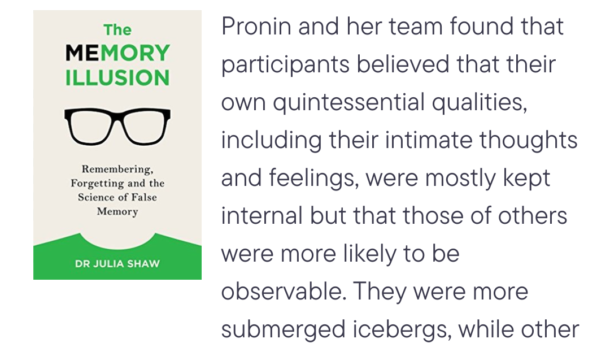Pronin and her team found that participants believed that their own quintessential qualities, including their intimate thoughts and feelings, were mostly kept internal but that those of others were more likely to be observable. They were more submerged icebergs, while other people were more visible icebergs. This makes sense from a memory perspective because we have direct access to our own thoughts and feelings and so appreciate that they can be complicated and nuanced – which makes them difficult for other people to understand. On the other hand, it can be difficult or even impossible to appreciate the complexity of the thoughts and feelings of others in anything other than a basic ‘surface’ way – we tend towards assuming that is all that there is to understand. Our general outlook is ‘I’m a riddle, but my friend is an open book.’ This bias turns out to be really important for our decision-making and arguing skills. In their final study, Pronin and her team asked 80 participants to complete a background questionnaire on a number of politically relevant topics, including such items as whether they identified as liberal or conservative, or whether they were pro-life or pro-choice. Then, several weeks later, they asked questions about how well the participants thought their in-group knew their out-group, and vice versa. So, for example, they asked self-identified conservatives how much conservatives as a whole know about liberals, and they asked them how much they thought liberals knew about conservatives. They found that liberals and conservatives both claimed to know the other side better than the other side knew them, as did those on either side of the abortion debate. Asymmetric insight helps explain why in arguments and debates we may believe that the other side will never understand our point of view. We may also think we perfectly understand their point of view, perhaps also bolstered by the superiority illusion that we are smarter and more informed than our opponents. As Pronin suggests at the end of her paper, we can begin to think ‘I know everything about the other party, and I know they are wrong. They don’t even try to understand my arguments. If only they knew more about it, they would be on my side.’ It is an easy trap to fall into, and one that is a staple of political shouting matches. So, overconfidence has far-reaching implications, from bias in our everyday internal dialogue when evaluating relationship fairness, to our inability to give our failures equal weight and acknowledgement to our successes, and our problematic assumptions about the knowledge other people have of us and we of them. It touches every aspect of our lives. Even if we wish to be humble and take pains to avoid overconfidence illusions, we may not be able to – they are largely the by-product of selective memory processes we cannot control.
Why do we tend to assume that we know more about issues and problems as compared to those on the opposite side? Well this passage gives us a very pretty simple answer to that. We have the full perspective of our own depth of thought, but we only witness the surface of the thought processes of others.
Ever feel like people never take you seriously or do not put enough weight on what you say? That probably boils down to how much (or little) you communicate. Many times, we don’t do too great a job in communicating the full depth of our thoughts, and eventually fall into the trap of shouting matches and conflicts.



